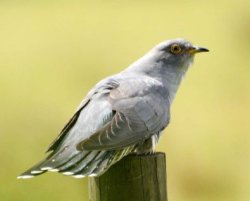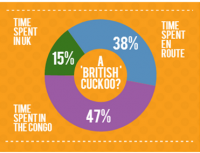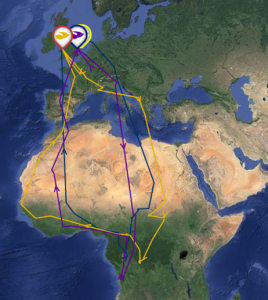Going Cuckoo!
By Paul Homewood
https://www.bto.org/science/migration/tracking-studies/cuckoo-tracking
The British Trust for Ornithology, BTO, are concerned about the declining population of cuckoos:
We’ve lost over half the number of Cuckoos in the UK over the last 20 years.
Since 2011 we’ve been satellite-tracking Cuckoos to find out why. We’ve learned lots of vital information which could help us to understand our Cuckoos – about the routes they have taken, and some of the pressures they face whilst on migration.
But there is still more to discover. We now need to look more closely at how dependent they are on, and how much their migration is linked, to the drought-busting rains of the weather frontal system known as the Inter Tropical Convergence Zone (ITCZ) as they move out of the Congo rainforest and begin to head back to the UK via West Africa.
https://www.bto.org/science/migration/tracking-studies/cuckoo-tracking
Unsurprisingly, they blame it on climate change.
It’s well known that we have lost over half of our breeding cuckoos during the last twenty-five years. Populations of many UK breeding migrant species are declining, however, there is little known about the mechanisms of these declines.
Climate change is causing the timings of the spring season to change and there is evidence that many migrant species are not advancing their arrival times sufficiently to track the earlier spring. There is also some suggestion from previous studies that there are constraints in the migration timing of species wintering in or beyond the humid zone in Africa.
We also know from the BTO/JNCC/RSPB Breeding Bird Survey that Cuckoos are doing better in some areas of the country than in others, with the decline in England (63%) being greater than in Scotland and Wales, but why are they are declining at the rate they are?
Clearly we need to understand all aspects of the Cuckoo’s annual cycle before we can begin to suggest what might be driving the decline.
https://www.bto.org/science/migration/tracking-studies/cuckoo-tracking/about
To find out more they have been tagging the poor little blighters .
What we have learnt so far

Migration for Cuckoos appears to be an even more risky business than we expected and, even with only five groups of Cuckoos to look at, it is obvious that there can be huge between-year differences in the challenges they face.
To date we have tagged over 50 birds. Some of the losses throughout the project are, we think, associated with tag failure, rather than the death of the birds. Given that Cuckoo numbers in the UK are declining, one of the key aims of the project is to try to understand the circumstances that may be contributing to increased mortality. Knowing how and when we lose marked Cuckoos is as important as understanding their migratory journeys.
Wintering locations
Cuckoos tagged in the UK spend the winter in central Africa. For the first time this project has allowed us to follow Cuckoos to their wintering grounds which seem mainly to be in and around the Congo rainforest. Understanding where Cuckoos winter could be an important factor in determining the causes for their decline.
Early departure dates
We discovered that Cuckoos leave the UK much earlier than we thought. The earliest departure date so far has been 3rd June and in each year over 50% of our tagged Cuckoos have left the country by the end of June, much earlier than expected!

Chris, one of our tagged Cuckoos, spends only roughly
15% of his time in Britain. .
‘British’ Cuckoos?
We’ve found that Cuckoos arrive in Britain towards the end of April and beginning of May and many leave again during June. This means that Cuckoos like Chris only spend a small percentage of the year here. Chris spends roughly 47% of his time in Africa, 38% of his time is spent on migration and just 15% in Britain!.
Variety of exits
Our Cuckoos head out of the UK in a variety of directions, some due east across the North Sea to the Netherlands and Belgium while others head south across the English Channel into France.
Two main migration routes
Tracking Cuckoos confirmed a migration route through Italy as expected from ringing data but two Cuckoos from the first year went west via Spain, highlighting a brand new migration route and a stopover site north of Madrid.
European stop-over sites
Stop-over sites are important fuelling areas for migrant birds, often areas rich in food which allow birds to fatten up for the journey ahead. Many of our Cuckoos have spent time near the River Po in Italy, confirming this is a very important fattening site for British Cuckoos which allows them to cross the Mediterranean Sea but also the crossing of the Sahara desert at its widest point.
African stop-over sites
All of our Cuckoos have crossed the Sahara each spring from previously unknown stopover sites in West Africa. It had been formerly supposed that Cuckoos crossed the Sahara in a mammoth flight direct from their wintering locations all the way to North Africa or southern Europe, so this stopover was highly unexpected. Understanding more about the location of important stop-over sites could be another crucial part of the conservation of this species.

The circular southward and northward migration routes taken by Chris,
David and BB in 2013/14.
Return routes
The Cuckoos followed so far take a different return route to the UK than the one they followed on their outward autumn migration. No matter which route they take south, whether it be via Spain, Italy or further east, all the Cuckoos head to West Africa to make the return crossing over the Sahara Desert to Europe. This information suggests that there are good reasons why Cuckoos visit west Africa on their way back and this is another important aspect of their journey which could prove a pinch point in their success.
Speed of spring migration
Our Cuckoos take just under two months to complete the journey from their wintering locations to England. This is compared to the four or so months it takes them to reach their wintering locations on their autumn migrations. Their arrival back to the UK is important as they need to find a mate and ensure there is plenty of food at the time when youngsters hatch and are reared by host species.
Mortality
Having followed Cuckoos over a number of years we are beginning to gather a wealth of data about the difficult points during the Cuckoo’s annual cycle. Knowing where the birds are struggling (and dying) will help us understand how their numbers change and hopefully will help to identify the causes of their declines to help inform conservation in the future.
https://www.bto.org/science/migration/tracking-studies/cuckoo-tracking/what-have-we-learnt
Colour me unconvinced!
Ant statistician worth his salt would laugh at a sample of just 50 birds, particularly when, as the BTO admit, many of the disappearances are due to tag failure, and not actual deaths.
Cuckoos eat insects, mostly caterpillars and beetles. It does not take a genius to work out that pesticides and other modern farming practices have much reduced their food supply in recent decades. You do not really have to look further to see why populations have declined.
The fact that the decline has been much greater in England than in Scotland & Wales would seem to bear this out.
The tracking project has been funded by the BBC Wildlife Trust, along with Essex & Suffolk Water. No doubt the BBC will be more than happy to see the blame put on climate change!
Comments are closed.

“It’s well known that we have lost over half of our breeding cuckoos during the last twenty-five years. Populations of many UK breeding migrant species are declining, however, there is little known about the mechanisms of these declines.”
I know of one mechanism for these declines: Windmills.
African avian refugees?
I wonder if the BBC can ask Emma Thompson what she thinks of their plight.
we are living through a shameful chapter in the history of science when real curiosity and objective scientific inquiry takes a back seat to a movement in which a predetermined cause for all things bad is the starting point of research.
Did they ask Chris, the cuckoo, what he thought about it? Maybe he bought a time share place.
Cuckoos in decline?
What about the poor old British songbirds?
I just asked a Thrush and he said “Bloody good thing, I say. 20 years ago there were far too many of the buggers! It’s hard enough bringing up your own kids without these Congolese dumping their nippers onto you.”
Of course, I reported the Thrush’s comment as a Hate Crime…..
Chuckle, chuckle.
If there is a decline in cuckoo population, could it be because there is a decline in the population of other birds of the sort that are typically tricked into adopting cuckoos?
“Climate change is causing the timings of the spring season to change and there is evidence that many migrant species are not advancing their arrival times sufficiently to track the earlier spring”
I suppose they forget that some migrant species are now staying in the UK all year round. Blackcaps are now a regular sight in our garden even in winter. Maybe it’s due to “Climate Change”, maybe it’s because we put food out when there would normally be nothing for them to eat. Or perhaps they have also had enough of being shot or trapped by our Mediterranean cousins whilst en-route? Let’s just call it “Evolution”, which has been going on for millions of years, just like Climate Change…
[…]Understanding where Cuckoos winter could be an important factor in determining the causes for their decline.
We discovered that Cuckoos leave the UK much earlier than we thought[…]
Just two of the very basic things they didn’t know about Cuckoos… But they know they must be in decline and global warming is probably responsible.
Groan …
such objectivity is overwhelming….. I think I need to eat an ice cream to recover before global warming busts all our freezers 🙂
Then there’s all the birds netted & shot as they migrate over Spain Italy & particularly Malta
Malta is clamping down on the killing of songbirds.
I dont know why they were not expecting cuckoos to migrate in June. Nearly 50 years ago in Berkshire, I remember my mother teaching us kids a rhyme:
The cuckoo comes in April
And sings his song in May.
In the middle of June
He changes his tune
And then he flies away.
We knew cuckoos would be gone by the end of June.
How did we manage before they invented climate change?
From a US perspective it seems as if the cuckoos have found a comfortable home in both Parliament and the BTO..
“We’ve lost over half the number of Cuckoos in the UK ”
No, they are hiding in the DECC !!
With Chris Packham being President no doubt the BBC will inform us of the plight of the Cuckoo. A look at their accounts proves interesting:
Click to access AnnualReport%26Accounts14-15fin-unsigned.pdf
Two thirds of their income spent as costs of raising income? No wonder they make losses.
I wonder how the putative pensioners view the extreme unlikelihood of any payout?
“Two thirds of their income spent as costs of raising income? ”
That’s a 33% gross profit, so not a bad performance.
Sainsburys 2016
Turnover = £M 23,506
Cost of sales = £M 22,050
Gross Profit = £M 1,456
Gross Profit % 6.2%
Tesco, its gross margin was 6.3% in 2014
August marks the start of the annual migration of millions of birds from their European breeding areas to their wintering grounds in Africa. Many fly across the eastern Mediterranean to Egypt, where they land, exhausted, on a coast along which hundreds of kilometers of trappers’ nets have been spanned to create almost unbroken walls of death on the seaside dunes. A German wildlife TV crew working in Egypt in 2012 year estimated that almost continuous nets lined at about 700 km of the coast during the autumn migration.
These coastal nets will catch at least 140 million birds this year, according to one biologist’s estimate. This does not include those killed by other means: trees shrouded in nets with north-facing openings catch instinct-propelled, southbound migrants before they can head across the Sahara, ingenious shade traps set on the ground snare birds seeking relief from the sun and lime-coated sticks strategically placed in bushes bring birds to a sticky end.
Those birds that make it through the coastal gauntlet into the Western Desert face more danger. Almost every oasis and isolated grove of acacia trees, ‘magnets’ for birds seeking shade and rest during their strenuous desert crossings, is occupied by hunters who shoot at every bird they see, say local conservationists.
Egyptians have caught migrant birds for subsistence since the time of the pharaohs, but in recent years the intensity of the trapping and shooting has escalated to unprecedented levels. Wildlife law enforcement, never strong, has become almost nonexistent in the political turmoil that has enveloped the country since Mubarak was deposed in early 2011.
Source: http://www.guardian.co.uk/environment/nature-up/2013/jul/19/
If it were climate change they would just go 100 miles further North.
Surely the decline in “our” cuckoo numbers could just mean that fewer birds are coming to Britain and that more are going elsewhere? A bit like tourists: their preferences change.
Cuckoos birds in decline?
Here in the U.S. we find many of them in Congress, perhaps they need to examine their Parliament closer…
The non-flying segment of the UK Cuckoo population seems to be well established.
Well Brexit is the new current scapegoat
Maybe the BBC will we’ve this into their reports also
Bullsheet! There are just as many Cuckoos today as there have been for the past 50 years in NE Derbyshire! If any changes have occurred then I reckon they may have slightly increased in number. Throughout May they are all over rthe place….Cuckoo heaven for anyone who likes them.